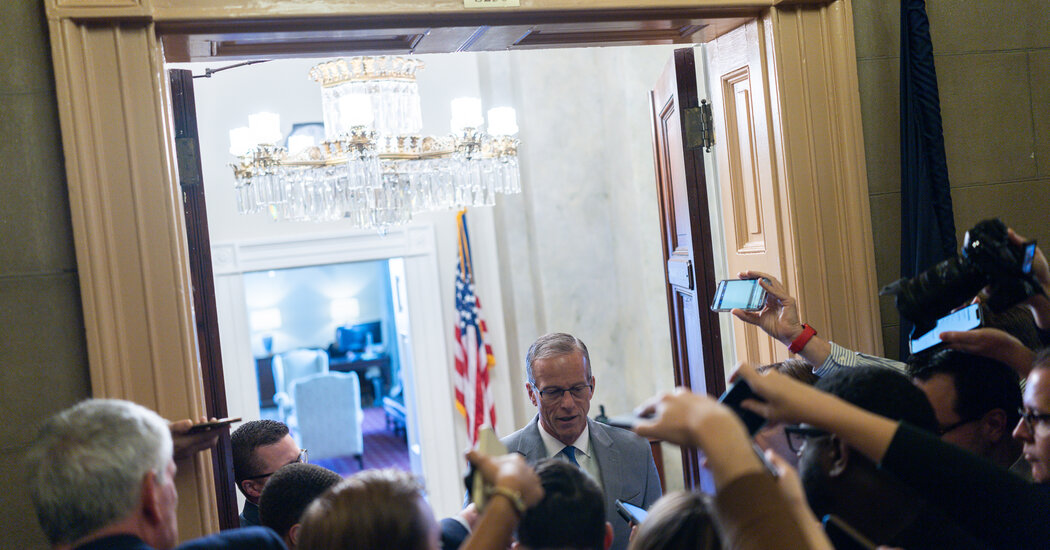Copyright The New York Times

Republicans and Democrats on Thursday stepped up their efforts to find a way out of the government shutdown, as the funding impasse threatened to snarl flights across the country and stretched into a 37th day. Senator John Thune, Republican of South Dakota and the majority leader, told G.O.P. lawmakers that he planned to call a vote on Friday to advance the House-passed stopgap bill, with the goal of attaching to it a new short-term spending bill. That package would fund the government into January, and include three separate measures to fund programs related to agriculture and military construction, and legislative agencies for most of 2026. The trio of spending bills is the product of quiet bipartisan talks that have picked up in recent days among a group of Democratic moderates and a handful of centrist Republicans. Mr. Thune’s strategy would effectively dare Democrats to oppose funding measures that their own colleagues have worked to craft. But the package omits the Democrats’ central demand in the shutdown fight: an extension of expiring federal health insurance tax credits that are slated to expire at the end of the year. Some Democrats have also quietly pressed Republicans to include language that would reverse the mass firings of federal workers carried out by the Trump administration during the shutdown. Senator Thom Tillis, Republican of North Carolina, said his party’s leaders were aiming to update the stopgap spending bill the House passed last month to fund the government through Nov. 21 and to sweeten the deal with “consensus appropriations measures.” Democrats have repeatedly blocked the House bill. Mr. Thune has said he is willing to allow a vote on extending the health care subsidies. But Democrats have held out for a better deal, noting that the House would likely kill any such measure. “The Democrats are upping the ante saying they want a guaranteed outcome, versus just a vote,” Mr. Tillis said. “That may take some more work.” Democrats huddled in a closed-door luncheon for nearly two hours on Thursday to discuss what it would take to win their votes to reopen the government. It was the first time the party had met as a caucus to discuss a path forward on the shutdown after they posted election victories in New York, New Jersey and Virginia. Some Senate Democrats pointed to their party’s wins as a sign that voters supported their fight to extend the health coverage subsidies, and urged leaders to dig in. But others were wary of prolonging a shutdown that has already had painful consequences, and were searching for a compromise that would allow them to end the crisis. “There was a real sense of gravity given what happened on Tuesday,” Senator Chris Murphy of Connecticut said as he emerged from the meeting. “It was a pretty clear message from the American people.” He added: “These have been really good, organic discussions. Everyone understands the importance of what happened on Tuesday and wants us to move forward in a way that honors that.” Senator Andy Kim of New Jersey said that he and other freshmen Democrats who had recently served in the House had “opened up a channel of dialogue” with Republicans in that chamber who were “concerned” about letting the health care subsidies lapse. “We certainly feel very recommitted to this fight and trying to deliver tangible results to help people with exploding health care costs,” Mr. Kim said. Complicating matters is Speaker Mike Johnson’s refusal to commit to allowing legislation extending the subsidies to receive a vote on the House floor. Some politically vulnerable House Republicans have signed on to a bill preventing the tax credits from expiring and have called for a vote on it. That would almost certainly violate what is known as the Hastert rule, an unspoken but inviolable tenet among House Republicans that the speaker will not put legislation to a vote that cannot capture the support of a majority of lawmakers in the majority. “The House did its job on Sept. 19,” Mr. Johnson told reporters at the Capitol on Thursday, referring to when House Republicans passed their stopgap legislation. “I’m not promising anybody anything. I’m going to let this process play out.” Annie Karni and Megan Mineiro contributed reporting.



